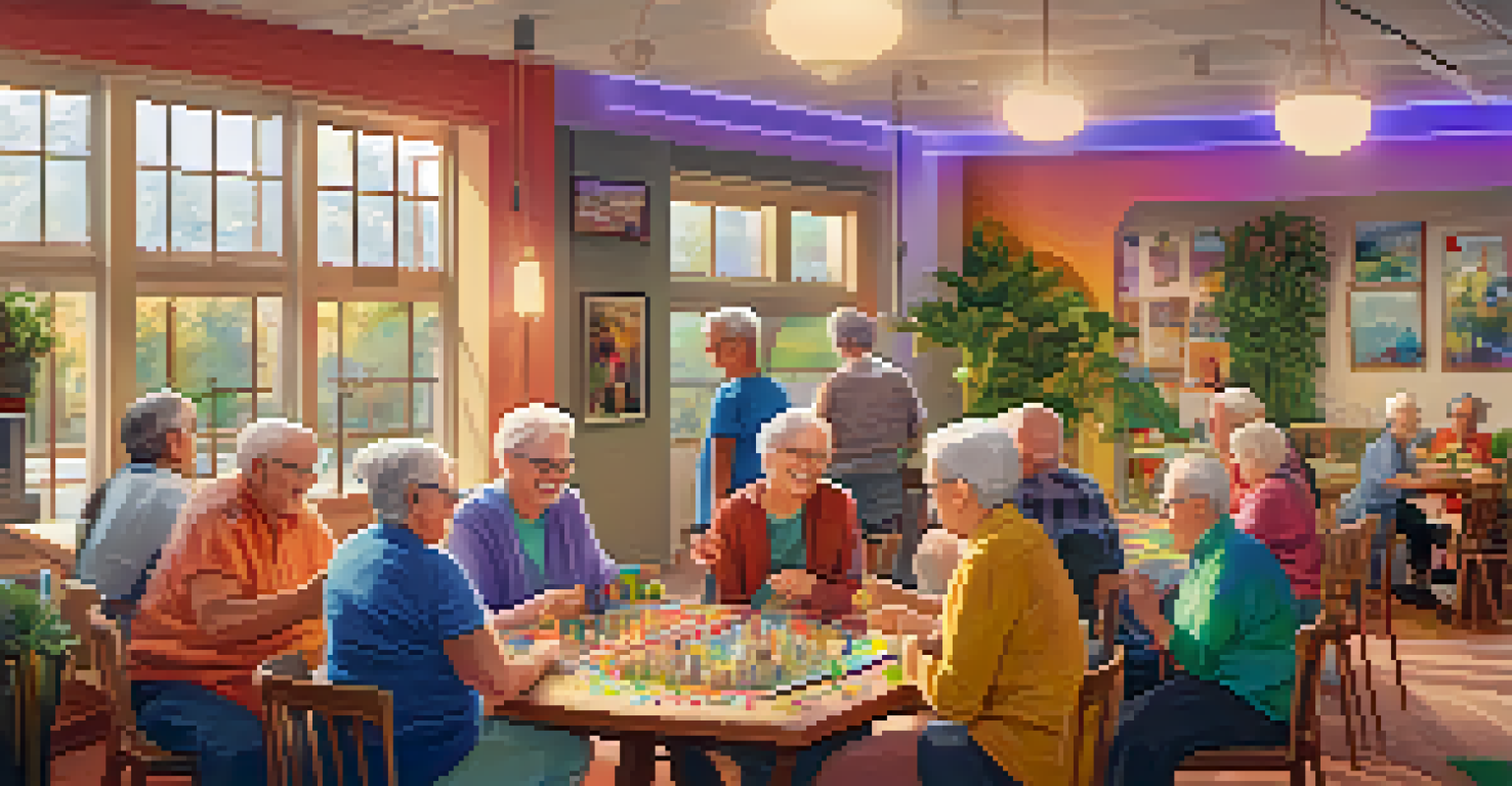Health Disparities in the Aging LGBTQ+ Community

Understanding Health Disparities in LGBTQ+ Seniors
Health disparities refer to the differences in health outcomes and access to healthcare among various populations. For the aging LGBTQ+ community, these disparities often stem from a combination of social, economic, and healthcare-related factors. As LGBTQ+ individuals age, they may face unique challenges that can exacerbate existing health issues.
The greatest gift of life is friendship, and I have received it.
Many older LGBTQ+ adults have experienced discrimination, stigma, and social isolation throughout their lives, which can lead to chronic stress and its associated health problems. This history of marginalization can impact their willingness to seek medical care, further complicating their health outcomes. Understanding these disparities is essential for developing effective interventions.
Additionally, the intersection of age and sexual orientation can lead to a lack of tailored healthcare services. Many healthcare providers may not be trained to address the specific needs of LGBTQ+ seniors, making it crucial to advocate for better education and resources in this area.
Access to Healthcare: Barriers for LGBTQ+ Seniors
Access to healthcare is a significant issue for many aging LGBTQ+ individuals, often due to previous negative experiences with the healthcare system. Fear of discrimination or lack of understanding from providers can prevent seniors from seeking necessary medical attention. This barrier can lead to untreated health issues and deteriorating conditions over time.

Moreover, financial constraints, particularly for those on fixed incomes, can limit access to quality healthcare. Many LGBTQ+ seniors may not have adequate retirement savings or may have been excluded from traditional employment benefits throughout their lives. Addressing these financial disparities is crucial for ensuring equitable access to healthcare.
Health Disparities for LGBTQ+ Seniors
Aging LGBTQ+ individuals face significant health disparities due to discrimination, stigma, and lack of tailored healthcare services.
Transportation can also be a barrier for older adults who may have mobility challenges. For those living in rural areas, the lack of nearby healthcare facilities can make it even more difficult to receive timely care. Solutions must consider these logistical challenges to improve healthcare access for aging LGBTQ+ individuals.
Mental Health Challenges Facing LGBTQ+ Seniors
Mental health is a critical component of overall well-being, yet aging LGBTQ+ individuals often face unique mental health challenges. Many have experienced lifetime stigma, which can lead to anxiety, depression, and feelings of isolation. These issues can be exacerbated as they age and face additional challenges such as loss of loved ones or declining health.
In diversity there is beauty and there is strength.
Social support plays a crucial role in mental health, and for many LGBTQ+ seniors, this support may be lacking. Disconnection from family, friends, or community can lead to feelings of loneliness and depression. Engaging with LGBTQ+ community centers and support groups can help mitigate these feelings and provide a sense of belonging.
Furthermore, access to mental health services that are culturally competent and affirming is vital. Many mental health professionals may not be familiar with the unique experiences of LGBTQ+ seniors, making it essential to prioritize training and education in this area. This can help foster a more supportive environment for those seeking help.
Chronic Health Conditions Among Aging LGBTQ+ Individuals
Chronic health conditions such as heart disease, diabetes, and arthritis are prevalent among older adults, including those in the LGBTQ+ community. Research indicates that LGBTQ+ seniors may experience higher rates of certain conditions due to lifestyle factors and stressors related to discrimination. Understanding these patterns is essential for developing targeted health interventions.
Moreover, the fear of stigma can impact LGBTQ+ seniors' willingness to discuss their health concerns openly with providers. This reluctance may result in delayed diagnoses and treatment, exacerbating existing health issues. Creating an inclusive healthcare environment can help encourage more open discussions about health.
Barriers to Healthcare Access
LGBTQ+ seniors often encounter barriers such as fear of discrimination, financial constraints, and transportation issues, limiting their access to necessary healthcare.
Preventive care is crucial for managing chronic conditions, yet LGBTQ+ seniors may not receive the same level of preventive services as their heterosexual peers. Regular screenings and check-ups can help identify health issues early, leading to better outcomes. Public health initiatives need to focus on increasing awareness and access to these services for the aging LGBTQ+ population.
Social Support Networks for LGBTQ+ Seniors
Social support networks are vital for the health and well-being of aging individuals. For LGBTQ+ seniors, these networks can provide emotional support, companionship, and access to resources. However, many may find themselves increasingly isolated as they age, especially if they have outlived friends or family members.
Community organizations and LGBTQ+ centers play a critical role in fostering connections among seniors. These spaces can offer social activities, educational programs, and resources that help combat loneliness and promote mental well-being. Establishing strong community ties can significantly enhance the quality of life for aging LGBTQ+ individuals.
Peer support groups can also be beneficial, providing a safe space for seniors to share their experiences and challenges. These groups facilitate understanding and connection among participants, helping to reduce feelings of isolation. Encouraging participation in such programs can create a more supportive environment for aging LGBTQ+ adults.
Culturally Competent Care for Aging LGBTQ+ Individuals
Culturally competent care involves understanding and respecting the unique backgrounds and experiences of patients. For LGBTQ+ seniors, this means healthcare providers should be aware of the specific health challenges and disparities faced by this community. Training providers to be sensitive and informed can lead to improved health outcomes.
Creating inclusive healthcare environments is essential for fostering trust between LGBTQ+ seniors and their providers. This can include using preferred names and pronouns, as well as being aware of the historical context surrounding LGBTQ+ health issues. When seniors feel understood and respected, they are more likely to seek care and engage in their health management.
Importance of Social Support
Social support networks are crucial for the well-being of aging LGBTQ+ individuals, helping combat isolation and improve mental health.
Furthermore, healthcare policies should prioritize the needs of aging LGBTQ+ individuals. Advocating for legislative changes that support inclusive practices can help ensure that this community receives the quality care they deserve. This holistic approach is crucial for addressing the systemic issues contributing to health disparities.
Advocacy and Policy Changes for LGBTQ+ Seniors
Advocacy plays a crucial role in addressing the health disparities faced by aging LGBTQ+ individuals. By raising awareness about the unique challenges this community encounters, advocates can help drive policy changes that promote equitable healthcare access. This includes addressing systemic barriers and ensuring that LGBTQ+ seniors receive the support they need.
Organizations dedicated to LGBTQ+ rights and health can lead campaigns that focus on the specific needs of older adults. These initiatives can help educate policymakers about the importance of inclusive practices and funding for community resources. Advocacy efforts can also empower seniors to voice their concerns and seek the services they require.

Engaging in grassroots movements can foster a sense of community and solidarity among LGBTQ+ seniors. By working together to advocate for their rights, these individuals can create lasting change that benefits their health and well-being. Collectively, advocacy efforts can lead to a more supportive and inclusive environment for aging LGBTQ+ individuals.